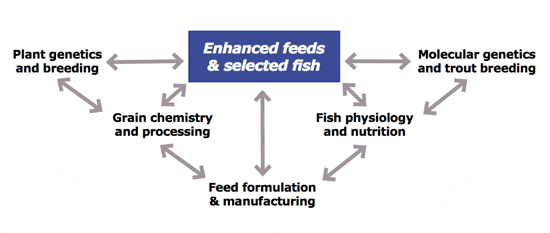For more than 100 years, rainbow trout have been farmed–or ‘cultured’–in the United States. Trout are now farmed in all 50 states and are one of our most valuable domestically grown fisheries products. In 2007, US farmers produced more than 57 million pounds of trout for consumers; state and federal hatcheries release more than 147 million trout annually for restoration, conservation, and recreational purposes.
Feeding these hungry trout presents a challenging research opportunity. For the last 50 years, fish meal has been the primary protein source in trout feeds, with levels up to 50 percent being common. With the rising cost of–and increasing global demand for fish meal and fish oil fish feed manufacturers are under pressure to find alternative ingredients to replace portions of fish meal and fish oil in aquaculture feeds.
So far, research using alternative feed ingredients demonstrates that fish meal is not a required dietary component for trout. Research also indicates that protein ingredients from sustainable sources can replace most of the fish meal in trout feeds as long as care is taken to ensure that all essential dietary nutrients are present in required amounts and in bioavailable forms. As research studies progress, the trou aquaculture industry will be able to move from fish meal-dependent to fish meal-free feeds.
However, it is not yet an easy or economically feasible task to remove or substantially reduce fish meal and fish oil in aquaculture feeds without affecting the growth and health of the fish. U.S. scientists from the disciplines of grain genetics, grain processing, fish nutrition, and fish genetics have teamed up to approach the problem from different but complementary directions. This multi-disciplinary approach is producing results that have enabled scientists to formulate and test novel trout feeds that are cost-effective and use significantly less fish meal and fish oil than conventional feeds. These studies are helping feed producers move toward the goal of developing fish meal- free feeds.

Alternative trout feeds developed to date are considered prototypes, since they are slightly more expensive than conventional feeds. Further, growth rates of trout remain about 10 percent slower than when a fish meal-based feed is used. However, the new feeds are in the early stages of development and the research is beginning to show that total elimination of fish meal from finfish diets is not only feasible, it also has other performance benefits.
For example, research is showing that supplementation of specific nutrients to a plant-based fish diet–including the amino acid, taurine, as well as electrolytes, and higher levels of specific vitamins–results in weight gains equal to trout fed fish meal-based feeds. The resulting fillets are also just as flavorful and nutritious as the fillets from trout fed fish meal-based diets.


